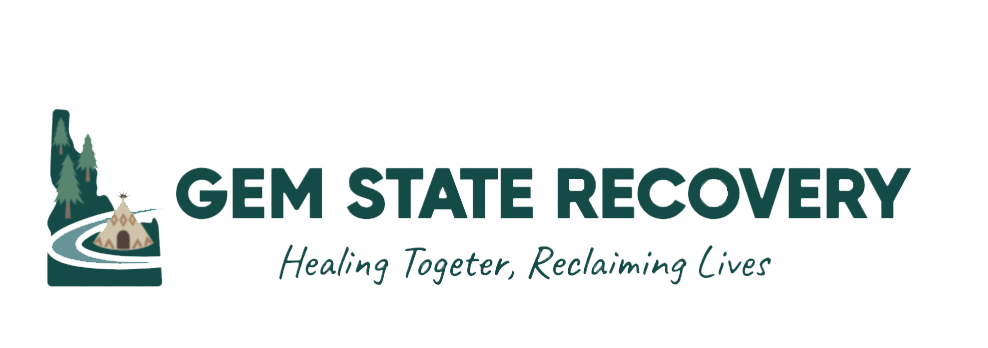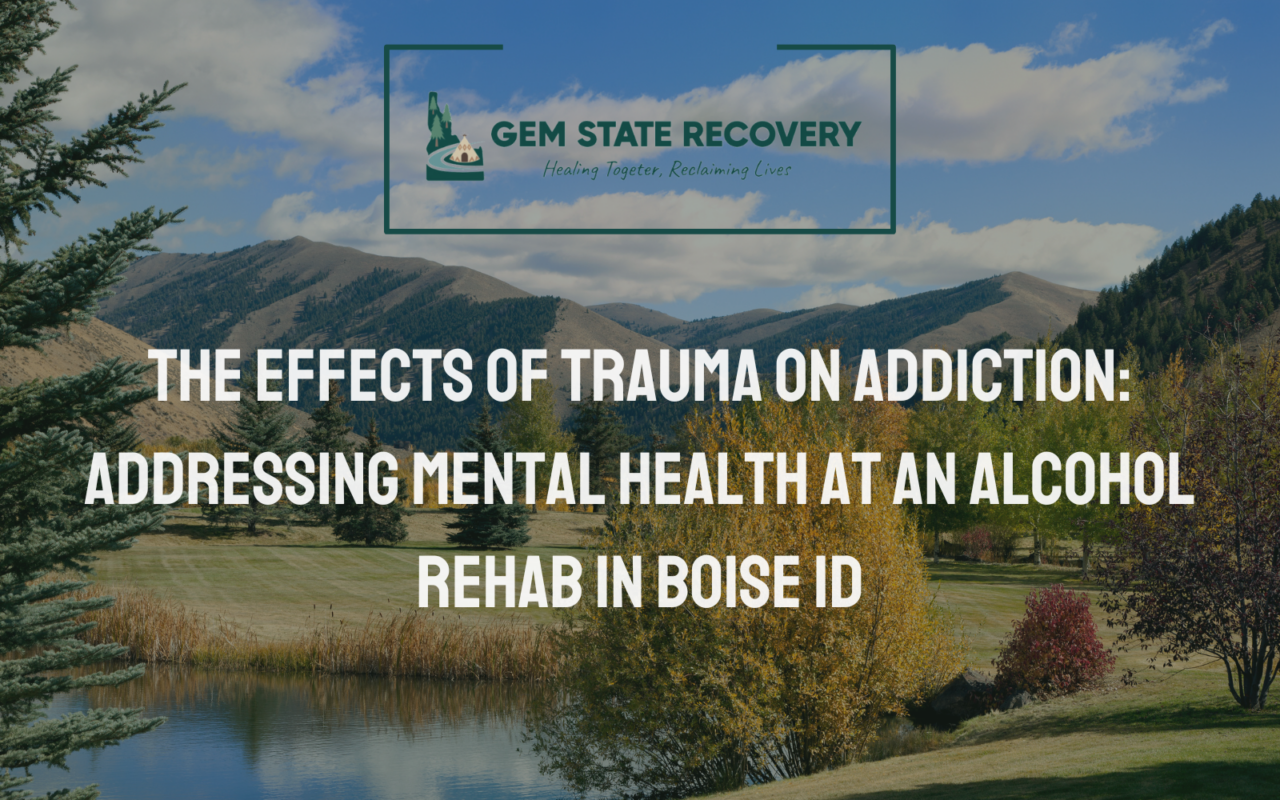Trauma and addiction are like two sides of the same coin, intricately linked in a cycle that can be challenging to break. For many individuals grappling with addiction, the roots of their substance use lie in past traumatic experiences. Understanding this connection is crucial for effective treatment and long-term recovery. At Gem State Recovery, an alcohol rehab in Boise ID, we specialize in addressing the complex relationship between trauma and addiction. Our holistic approach includes comprehensive mental health care, ensuring that all aspects of an individual’s well-being are considered in the recovery process.
This blog will delve into how trauma impacts addiction, the critical importance of addressing mental health in treatment, and the unique methodologies we employ at Gem State Recovery to support our clients.
Understanding the Link Between Trauma and Addiction
What Constitutes Trauma?
Trauma is an emotional response to a distressing or disturbing event. It can arise from various situations, including physical or emotional abuse, loss of a loved one, a severe accident, or even witnessing a traumatic event. Trauma affects people differently; some may experience it as a single, acute incident, while others may endure prolonged exposure to distressing circumstances, known as complex trauma. The impact of trauma can be long-lasting, affecting an individual’s emotional health, relationships, and overall quality of life.
How Trauma Influences Substance Use
Trauma often leads individuals to seek ways to numb the pain, which can include alcohol and drug use. This self-medication provides temporary relief but can quickly develop into dependency, as the underlying trauma remains unaddressed. The cycle of trauma and addiction can be self-perpetuating: the more someone uses substances to cope, the less they can confront and heal from their trauma, increasing the likelihood of continued substance use. Seeking help through alcohol rehab in Boise ID can break this cycle and support healing.
The Connection with PTSD
Post-Traumatic Stress Disorder (PTSD) is a mental health condition triggered by experiencing or witnessing a traumatic event. Symptoms include flashbacks, nightmares, severe anxiety, and uncontrollable thoughts about the trauma. Individuals with PTSD may turn to alcohol or drugs as a way to escape their symptoms, inadvertently leading to a substance use disorder. Research shows that up to 50% of people seeking treatment for a substance use disorder also meet criteria for PTSD, highlighting the close relationship between these conditions.
The Importance of Addressing Mental Health in Addiction Recovery
Comprehensive Assessment: The First Step
At Gem State Recovery, we begin each client’s journey with a comprehensive assessment that includes a thorough evaluation of their mental health. This assessment helps us identify any co-occurring disorders, such as PTSD, anxiety, or depression, often linked to both trauma and addiction. By understanding the full scope of a client’s needs, we can tailor a treatment plan that addresses both their addiction and mental health issues, providing a more robust foundation for recovery, especially in our alcohol rehab in Boise ID.
Trauma-Informed Care: A Crucial Approach
Trauma-informed care is a cornerstone of our treatment philosophy at Gem State Recovery. This approach involves understanding the widespread impact of trauma, recognizing the signs and symptoms of trauma in clients, and responding by integrating knowledge about trauma into all aspects of care. This method helps create a safe and supportive environment where clients feel understood and secure, which is crucial for effective treatment.
Integrated Treatment Plans: Addressing the Whole Person
We believe in treating the whole person, not just the addiction. Our integrated treatment plans combine addiction therapy with mental health services, providing a holistic approach to recovery. These plans often include evidence-based therapies such as:
- Cognitive Behavioral Therapy (CBT): CBT is a structured, goal-oriented therapy that empowers clients to identify and challenge negative thought patterns and behaviors associated with their trauma and substance use. Particularly in alcohol rehab in Boise ID, working with a trained therapist helps individuals replace detrimental thoughts with healthier, more constructive ones, ultimately leading to improved mental well-being and coping strategies.
- Eye Movement Desensitization and Reprocessing (EMDR): EMDR is a specialized therapeutic approach designed to help individuals process and heal from traumatic memories that may be impacting their current lives. Through structured sessions, clients harness the power of bilateral stimulation—typically through guided eye movements—to reprocess distressing memories, helping to reduce their emotional charge and integrate them into a more adaptive narrative.
- Mindfulness Practices: Mindfulness techniques, including meditation, deep breathing exercises, and body scans, serve as powerful tools for clients to cultivate awareness of the present moment. Engaging in these practices helps individuals reduce anxiety by promoting relaxation and allowing them to observe their thoughts and feelings without judgment. This enhanced awareness can significantly improve emotional regulation, enabling clients to respond to stressors in a more balanced and effective manner.

Family Therapy and Support: Healing Together
Trauma and addiction don’t just impact the individual; they create a ripple effect that touches families and loved ones as well. The emotional strain can lead to breakdowns in trust, communication, and overall family dynamics. At Gem State Recovery, we understand the importance of addressing these issues, which is why we offer comprehensive family therapy sessions designed to help rebuild that essential trust and improve communication within the family unit. These sessions provide a safe space for family members to express their feelings, share experiences, and foster understanding. This support is vital for the client’s recovery journey, especially in alcohol rehab in Boise ID, as a strong, supportive network not only helps in healing but can significantly enhance their chances of maintaining long-term sobriety. By working together as a family, everyone can contribute to a healthier, more positive environment that supports recovery and growth.
Aftercare and Ongoing Support: Sustaining Recovery
Recovery is a lifelong journey that doesn’t end when a client leaves our facility; in fact, it marks the beginning of a new chapter. At our alcohol rehab in Boise ID, we understand that the transition back to everyday life can be challenging, which is why we provide comprehensive aftercare planning and ongoing support tailored to each individual’s needs. Our goal is to help clients maintain their sobriety and continue to address their mental health needs with confidence and resilience.
Our aftercare services are designed to offer a robust support system and may include outpatient counseling, where clients can work one-on-one with trained therapists to navigate their feelings and experiences. Additionally, we facilitate support groups that foster community and connection, allowing clients to share their journeys with others who understand their struggles. Continued therapy sessions are also available, ensuring that clients have consistent access to the professional guidance they need to stay on track.
By equipping clients with essential tools and resources, we strive to empower them to build a fulfilling life in recovery, filled with hope and opportunities for personal growth.
Why Addressing Trauma is Essential in Addiction Treatment
Preventing Relapse
One of the most significant benefits of addressing trauma in addiction treatment is the prevention of relapse. Unresolved trauma can serve as a potent trigger for substance use, as individuals may turn to alcohol or drugs to cope with the pain and stress associated with traumatic memories. This coping mechanism often leads to a cycle of addiction that can be difficult to break. By addressing these deep-seated issues through comprehensive therapy and other supportive measures, such as group counseling or trauma-focused interventions at alcohol rehab in Boise ID, clients can develop healthier coping strategies. This holistic approach not only empowers clients to confront and process their traumatic experiences but also equips them with the tools necessary to manage triggers effectively. As a result, they are better prepared to navigate the challenges of recovery, ultimately leading to a significant reduction in the risk of relapse and a greater chance for sustained sobriety and emotional well-being.
Improving Quality of Life
Treating co-occurring mental health disorders is crucial, especially in alcohol rehab in Boise ID, as it not only helps prevent relapse but also significantly enhances the overall quality of life for our clients. When individuals receive comprehensive care that addresses both their addiction and mental health issues, they benefit from a holistic approach that considers the interplay between these challenges. This integrated treatment allows for a deeper understanding of the underlying factors contributing to both conditions. As a result, clients are more likely to experience substantial improvements in their emotional well-being, leading to better relationships, enhanced coping skills, and improved daily functioning. Moreover, the support of therapists and peer groups during this process fosters a sense of community and belonging, further empowering individuals on their journey to recovery.
Building Resilience and Coping Skills
Understanding and processing trauma is essential for helping clients develop resilience, a crucial factor in achieving long-term recovery. At Gem State Recovery, we take a comprehensive approach to equip clients with the coping skills they need to navigate life’s challenges without resorting to substance use. Our dedicated team provides personalized support, focusing on teaching strategies for effectively managing stress, identifying and dealing with triggers, and maintaining a healthy lifestyle. This includes mindfulness practices, physical fitness routines, and nutritional guidance, ensuring that our clients have a well-rounded toolkit to bolster their emotional and physical well-being. By fostering these skills, we empower individuals to face adversity with confidence and strength, paving the way for a brighter, healthier future.
FAQs
What types of therapies are available at Gem State Recovery?
We offer a range of therapies tailored to meet the unique needs of each client. These include Cognitive Behavioral Therapy (CBT), Eye Movement Desensitization and Reprocessing (EMDR), and mindfulness practices. Our goal is to provide comprehensive care that addresses both addiction and any co-occurring mental health issues.
How does trauma-informed care benefit the recovery process?
Trauma-informed care benefits the recovery process by creating a safe and supportive environment for clients. This approach acknowledges the widespread impact of trauma and integrates this understanding into all aspects of treatment. By doing so, we help clients feel more secure and supported, which is crucial for effective healing and recovery.
Is family involvement important in the treatment process?
Yes, family involvement is a vital component of the treatment process. Family therapy sessions help rebuild trust and communication, providing a strong support network that is essential for long-term recovery. We encourage families to participate in the treatment process to better understand the challenges their loved ones face and learn how they can provide support.
What can I expect during the initial assessment at Gem State Recovery?
During the initial assessment, you can expect a thorough evaluation of your mental health, substance use history, and any co-occurring disorders. This assessment helps us create a personalized treatment plan that addresses all aspects of your well-being, ensuring that you receive the most effective care possible.
How does Gem State Recovery support clients after they leave the facility?
We offer a range of aftercare services designed to support clients after they leave our facility. These services may include outpatient counseling, support groups, and continued therapy sessions. Our goal is to provide ongoing support to help clients maintain their sobriety and continue to address any mental health needs.
Final Thoughts
Understanding the intricate relationship between trauma and addiction is crucial for effective treatment and long-term recovery. At Gem State Recovery, an alcohol rehab in Boise ID, we are committed to providing holistic care that addresses both the addiction and the underlying mental health issues that contribute to it. By offering comprehensive assessments, trauma-informed care, integrated treatment plans, and robust aftercare support, we help our clients build a strong foundation for a healthier, more fulfilling life.
If you or a loved one is struggling with addiction and trauma, know that you are not alone. At Gem State Recovery, we are here to support you on your journey to recovery. Reach out to us today to learn more about our programs and how we can help you heal. Call us at (208) 314-3107 or visit our website https://gemstaterecovery.com/.





